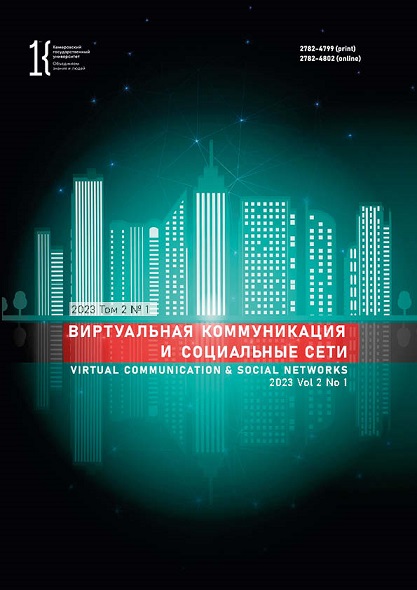Moscow, Russian Federation
Amateur film discourse is a new special subtype of discourse that has not yet been subjected to scientific research. Its participants have no special cinema education: they discuss the film industry based on their own life experience, ideas, and values. This work was part of the contemporary anthropocentric paradigm, where language comes to the fore as the most important property of human beings. The article identifies the genre of amateur film discourse using online Russian comments to the screen adaptation of Henry James’s What Maisie Knew (1897), directed by S. McGehee and D. Siegel (2012). The methods of comparison and discourse analysis revealed sincerity in the way the commentors evaluated their impressions. The commentors seemed focused on the plot and the action. The discourse was highly emotional and colloquial, filled with aposiopesis and rhetorical questions.
film, film review, film discourse, amateur film discourse, emotionality, Henry James, What Maisie Knew
1. Bolshanina L. E. The functions of youth slang in the British feature film discourse (based on the Jim O’Hanlon film "Your Christmas or Mine?"). Obshchestvo, 2023, (4-3): 80–85. (In Russ.) https://www.elibrary.ru/paxmfk
2. Broitman M. S. Analysis of two film versions of Dracula: translation adaptation of multimodal film discourse. Problems and Prospects of Modern Humanities: Pedagogy, Teaching Methods, and Philology: Proc. Intern. Sci.-Prac. Conf., Andijan, 21 Feb 2022. St. Petersburg: Gumanitarnaya Akademiya, 2022, 171–176. (In Russ.) https://www.elibrary.ru/yharmh
3. Zykova I. V. The poetics of cinema discourse in a polymodal dimension. Polymodal dimensions of discourse, ed. Iriskhanova O. K. Moscow: YaSK, 2021, 153–238. (In Russ.) https://www.elibrary.ru/zlxydc
4. Karasik V. I. The linguistic ladder of knowledge. Moscow: Pushkin Institute, 2022, 462. (In Russ.) https://www.elibrary.ru/bhcuqp
5. Kopytin A. I. Research of the axiological aspect of film discourse in the context of intercultural communication. Russkii yazyk za rubezhom, 2021, (3): 36–41. (In Russ.) https://www.elibrary.ru/gerulz
6. Lenets A. V. Language and culture as the factors of designing the national identity in the film discourse (based on the Austrian filmonyms). Izvestiya Volgogradskogo gosudarstvennogo social’no-pedagogicheskogo universiteta. Filologicheskie nauki, 2023, (2): 99–106. (In Russ.) https://www.elibrary.ru/pxzqku
7. Novikova Yu. V. The functions of baseball terminology in American film discourse. Modern Humanities Success, 2023, (6): 24–28. (In Russ.) https://www.elibrary.ru/lhrmml
8. Prasolova O. D. Film trailers as a component of film discourse. LUNN Bulletin, 2023, (63): 93–104. (In Russ.) https://www.elibrary.ru/kwvvpo DOI: https://doi.org/10.47388/2072-3490/lunn2023-63-3-93-104
9. Bushueva L., Muliukina A. Types and functions of precedent names in English-language cinematic discourse. Linguistics & Polyglot Studies, 2023, 9(3): 116–127. https://doi.org/10.24833/2410-2423-2023-3-36-116-127
10. Cornwell N. The Turn of the Screw and What Maisie Knew. NY: Red Globe Press, 1998, 252.
11. Dukhovnaya T. V. Study of Yakut cinematic discourse through film reviews analysis, research result. Theoretical and Applied Linguistics, 2022, 8(4): 15–30. https://doi.org/10.18413/2313-8912-2022-8-4-0-2 EDN: https://elibrary.ru/VVGYAK
12. Ekstein B. Unsquaring the Squared Route of What Maisie Knew. The Henry James Review, 1988, 9(3): 177–187.
13. Hulpke E., Bender T. K. A Concordance to Henry James’s What Maisie Knew. NY: Garland, 1989, 527.
14. The Cambridge companion to Henry James, ed. Freedman J. Cambridge: Cambridge University Press, 1998, 256.
15. Wolk M. Narrative and nurture in What Maisie Knew. The Henry James Review, 1983, 4(3): 196–206. https://doi.org/10.1353/hjr.2010.0108
16. Zykova I. V. Linguistic creativity and multimodal tropes in cinematic discourse. Russian Journal of Linguistics, 2023, 27(2): 334–362. https://doi.org/10.22363/2687-0088-33206 EDN: https://elibrary.ru/NFFPOR















